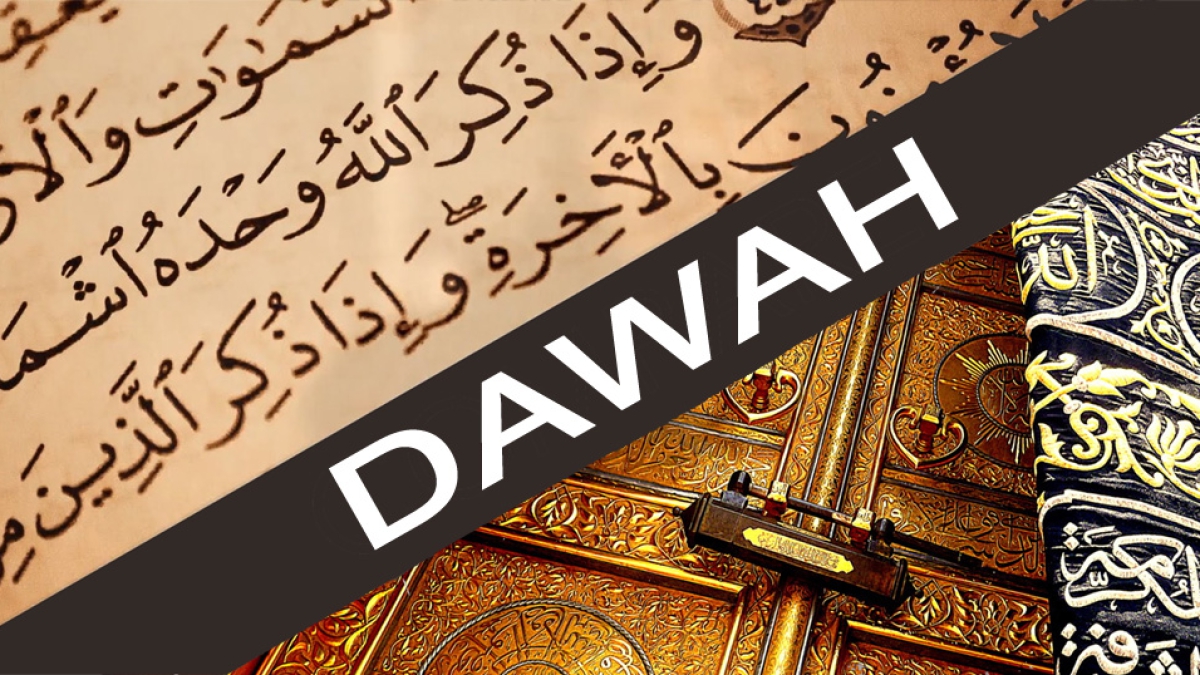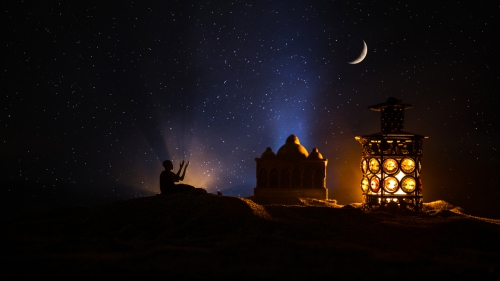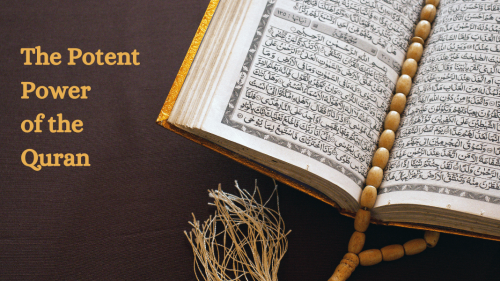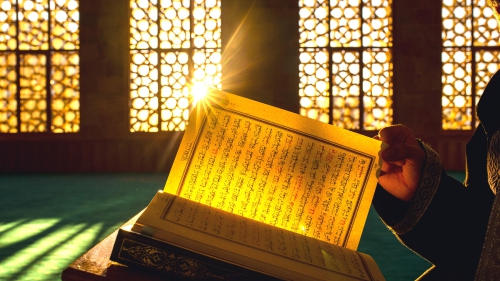Divine Methodology of Dawah

Da'wah, as we know, is an obligation upon every Muslim man and woman. The Holy Qur'an tells us Da'wah is the most favorite act loved by Allah (swt). It is the practice of His Prophets (Peace be upon them), the chosen servants of Allah who struggled in order to convey Allah's message to people despite afflictions, and hardships.
While doing so, they were humiliated, insulted and abused. But they demonstrated patience and steadfastness. Whenever they faced hostile reaction from their people, they followed Divine Methodology in their Da'wah effort and repelled the evil in the best possible manner. They showed highest moral character.
Da'wah is also the Sunnah (practice) of Prophet Muhammad (Peace be upon him). Allah recognized him as Daa'ee Ila-Allah ("Daa'ee" or "Daa'iah" means the one who calls people to Allah).
"O' Prophet Muhammad (Peace be upon him) We have sent you as witness, and a bearer of glad tidings, and a warner. And as one who invites to Allah (Islamic Monotheism) by His leave, and as a lamp spreading light." (Qur'an 33:45-46)
He (Peace be upon him) worked in the most difficult circumstances and gave a practical demonstration of excellence in moral character during his Da'wah effort. He did everything possible to convey Allah's message despite the most difficult response from the Makkan people. He remained firm, patient and confident of Allah's help and victory. He associated his will to the will of Allah and showed how to follow Allah's method in doing the Da'wah work.
Doing Da'wah is the individual responsibility of every Muslim man and woman. Allah commanded the believers to do whatever they can in order to spread Allah's message. He made the Muslim Ummah (community), both individuals and groups responsible for this noble cause.
"You (true believers in Islamic monotheism and followers of Prophet Muhammad (Peace be upon him) and his sunnah) are the best of peoples ever raised up for mankind; you enjoin Al-Ma'roof (good) and forbid Al-Munkar (evil), and you believe in Allah." (Qur'an 3:110)
"Let there arise out of you a group of people inviting to all that is good (Islam), enjoining Al-Ma'roof (whatever is good) and forbidding Al-Munkar (whatever is evil). And it is they who are successful." (Qur'an 3:104)
Abu-Saeed Al-Khudhri narrated the Prophet (Peace be upon him) saying: "Anyone among you who notices some thing evil should correct it with his own hand, and if he is not able to do so, then he should prohibit it with his tongue, and if he is not able to do so, he should at least consider it as bad in his heart, and that is weakest of faith, i.e. the lowest degree of faith." (Narrated by Muslim)
While the Qur'anic text talks about the importance of this obligation on the Muslim community both individuals as well as groups, we note Da'wah provides a unique way to open communication channels with other communities in order to inform them about Al-Islam, the religion of human dignity and honor. Through Da'wah, a Daa'iah can remove lots of misunderstandings, misrepresentations about this beautiful religion, and spread messages of peace, justice and fairness.
Since Qur'an declared Da'wah an individual responsibility, the question that arises here as to what should be the right way of doing Da'wah and what methodology and manners can be useful and result oriented.
In the Qur'an, Allah (swt) mentioned a complete and comprehensive set of Divine Guidelines about Da'wah, which include methodology, manners as well as the main characteristics necessarily acquired by those engaged in the field of Da'wah. They should learn and acquire those characteristics, and prove themselves as devoutly obedient servants of Allah. It is extremely important they apply Divine methodology and manners in their Da'wah effort to make it a complete success.
It is therefore, required from individuals, groups, and people in-charge of organizations involved in Da'wah work, to make sure they pay necessary attention towards their personality building process; thereby making themselves as perfect examples of true and sincere obedience of Allah. They should develop permanent habit of seeking Allah's help and forgiveness. By following the sunnah of Prophet Muhammad (Peace be upon him) in their daily life they should provide excellent examples of moral and ethical behavior. "Indeed in the Messenger of Allah you have a good example to follow, for him, who hopes for (the meeting with) Allah and the Last Day, and remembers Allah much." (Qur'an 33:21)
Allah (swt) guided His Prophet (Peace be upon him) throughout his Da'wah effort and asked him to apply divine manners when he conveyed Allah's message to the Makkan people, including his own family members, and others. Allah addressed Prophet Muhammad (Peace be upon him) and said:
"O'Muhammad (Peace be upon him) invite mankind to the way of your lord (Islam) with wisdom, and fair preaching, and argue with them in a way that is better. (Qur'an 16:125).
Applying wisdom-full approach in Da'wah is key to success. Hikmah (wisdom) is a gift from Allah. "He grants Hikmah to whom He wills, and he to whom the Hikmah is granted, is indeed granted abundant good. But none remember (receive admonition) except men of understanding". (Qur'an 2:269)
Good communication skills and presentation style as well as nice way of talking help make Da'wah effort a true success. Allah commanded Musa (Moses) (Peace be upon him) to adopt a soft and mild approach when He sent him along with his brother Haroun (Aaron) to the Fir'aun (Pharaoh).
"Go both of you, to Fir'aun (Pharaoh). Verily he has transgressed. And speak to him mildly, perhaps he may accept admonition or fear Allah." (Qur'an 20:43-44)
Development of necessary skills that make the Daa'iah able to defend evil with good and ability to face hostile reaction with patience also make Da'wah effort successful. This quality leaves a good impression on people and provides instant and positive results by mercy of Allah.
"The good deed and the evil deed can not be equal. Repel the evil with one which is better, then verily he, between whom and you there was enmity (will become) as though he was a close friend." (Qur'an 41:34)
The most essential quality required during Da'wah work is that of patience and steadfastness. Quality of patience and self-restraint will be of tremendous help to the Daa'iah to carry out his work in all circumstances.
Allah commanded His beloved Prophet (peace be upon him) to keep patient. A Daa'iah must show self-restraint in case of hostile reaction, argument, or abuse.
"And be patient; verily Allah wastes not the reward of the good doers." (Qur'an 11:115)
In Qur'an we find several examples where Allah commanded His Prophet (Peace be upon him) to practice patience.
"O Muhammad! (Peace be upon him) keep patience to what they say and ignore them in a good way" (Qur'an 73:10)
"And endure you patiently O' Muhammad (Peace be upon him), your patience is not but from Allah, and grieve not over them (polytheists and pagans), and be not distressed because of what they plot." (Qur'an 16:127)
"Therefore be patient O' Muhammad (peace be upon him) as did the "Messengers of Strong Will" (i.e. Noah, Abraham, Moses, Jesus, and Muhammad, Peace be upon them) (Qur'an 46:35)
"Verily many Messengers were denied before you O' Muhammad (Peace be upon him), but with patience they bore the denial, and they were hurt; till our help reached them, and none can alter the words (decisions) of Allah. Surely there reached to you the information (news) about the Messengers (before you)." (Qur'an 6:34)
A Daa'iah should always try to turn to Allah, learn how to increase his trust in Him and seek His help and protection. Allah commanded His Prophet (Peace be upon him):
"And if an evil whisper comes to you from Shaitan (Satan), then seek refuge with Allah. Verily He is All-Hearer, All-Knower." (Qur'an 7:200)
Prophet Muhammad (Peace be upon him) said: " The case of a believer is wonderful. There is good for him in every thing, and this characteristic is for him alone. If he experiences something pleasant, he is grateful, but if he comes across some adversity, he patient and submissive (to Allah's will) and that is good for him." (Narrated by Muslim)
A Daa'iah should, therefore, develop necessary skills that help him carry out his work in all circumstances and try to maintain a purely practical approach with beautiful communication and preaching style. This kind of approach will help Daa'iah become more acceptable to people. In case of hostile reaction, Allah requires Daa'iah to learn how to repel evil in the best possible way. Therefore, they should be well-prepared and patient enough to face any possible evil; be it in the form of mockery, un-necessary argument, or refusal, resistance, or non-acceptance and try to respond with the best possible way. At the same time the Daa'iah should demonstrate highest moral and ethical behavior to Muslim & Non-Muslim communities at all times. The Prophet (Peace be upon him) said: "The best among you are those who possess the best manners." (Al-Bukhari/Muslim)
He (Peace be upon him) also said: "I have been sent to bring good behavior to the highest perfection." (Musnad Ahmad)
The Daa'iah need to show highest amount of patience and self-restraint at the time of anger and learn how to forget and forgive people in order to excuse those who treat them badly.
"Show forgiveness, enjoin what is good, and turn away from the foolish." (Qur'an 7:199)
This particular quality should be a permanent part of the Daa'iah's personality.
"And the (faithful) slaves of the Most Gracious (Allah) are those who walk on the earth in humility and sedateness, and when the foolish address them (with bad words) they reply back with mild words of gentleness." (Qur'an 25:63)
A Daa'iah must show kindness and mercy in all his actions and endeavors. The Prophet Muhammad (Peace be upon him) said: "Whoever is devoid of kindness and mercy, is devoid of all goodness." (Abu-Dawoud)
In order to become a successful Daa'iah, one must possess sound Aqidah (beliefs). Aqidah makes a person truly recognize Allah (swt) and maintain his contact with Him. A Daa'iah is required to put his faith into practice with sincerity and devotion and discharge all obligations due to Almighty Allah by completely associating himself with His will. It is necessary to make his intention only to please Allah. "Actions are governed by intentions. Everyone is rewarded for what he intended," the Prophet (Peace be upon him) said in a Hadith.
A Daa'iah has to make sure he abstains from whatever is forbidden. He must completely stay away from "Riya" (show off). Development of strong conviction and strength in saying the truth without fear and hesitation is also needed. The quality of awareness of Allah will make the Daa'iah strong and confident in all his efforts. Habit of effective control over anger, passions, desires, and temptations will help make Daa'iah, a person of determination and strong will power. Abu Hurairah narrated the Prophet (Peace be upon him) as having said: "A strong person is not he who can overpower his rival in wrestling, but rather he who controls himself when roused to anger." (Al-Bukhari, Muslim)
Acquisition of these characteristics will be helpful to attract more people and make Da'wah efforts more effective and result oriented. It is also necessary to practice faith in all sincerity before the Daa'iah decides to teach or preach others. Therefore, all those interested to do Dawah, must present themselves as perfect examples of similarity in sayings and actions and avoid doing otherwise. Allah (swt) said: "O' you who believe! Why do you say that which you do not do? Most hateful it is with Allah that you say that which you do not do". (Qur'an 61:2-3)
Good communication skills and presentation style is also helpful. A Daa'iah needs to develop that unique divine quality with which he may be able to remove enmity and hatred from the hearts of people and make them as good friends. Therefore it is extremely important to obtain necessary knowledge and training in order to plan a logical and mature Da'wah strategy in an organized way. Sufficient knowledge of the area including city, country, language, and ethnicity of the people as well as working knowledge of mass media can prove very useful. The Daa'iah has to provide correct and authentic information. He should be well prepared and experienced enough to know how to document his talk with the Qur'an or the Sunnah of the Prophet (peace be upon him). This will be of great help to the Daa'iah in order to comprehensively define his mission to the people. Once the Daa'iah learned and completely understood Allah's method of doing D'wah, he will be able to convince and satisfy more people in case of argument, but without compromising basic established principles. Keeping this in mind, Da'wah without divine manners and characteristics should always be avoided. Any Da'wah activity without mature strategy and careful thinking may lead to un-necessary discussions and arguments and might result in hurting people's feelings and prove harmful rather than being useful and productive. The Prophetic teachings require faithful believers to protect the individual dignity and honor at all times.
The Prophets of Allah (Peace be upon them) gave the most beautiful and practical demonstration by applying this divine methodology in their Da'wah effort. Afflictions and hardships did not make them leave hope in Allah's promise. They taught others how to practice that unique quality of "patience & self-restraint" by which Allah can remove enmity and hatred from the hearts of people and change enemies into close friends. Their permanent relationship with Al-Mighty Allah (swt) made them seek refuge in Him in order to overcome incitement of discord from the Shaitan. It is because of their strong conviction that they became ultimate winners and qualified for Allah's victory at the end.
In order to see the application of this divine methodology in practical sense, let's examine few examples from the Qur'an.
Allah narrated the story of Prophet Nuh (Noah) (Peace be upon him) who humbled himself for almost a thousand years in order to convey Allah's message to his people.
"And indeed We sent Noah to his people, and he stayed among them (for the purpose of doing Da'wah) a thousand years less fifty years (inviting them with patience to believe in the oneness of Allah and discord the false deities)". (Qur'an 29:14)
Nuh (Noah) (Peace be upon him) adopted a simple style of Da'wah. He concentrated on his mission in a focused way and was aware of his responsibility:
"Indeed We sent Noah to his people and he said: O' my people worship Allah. You have no other god but Him.(None has the right to be worshipped but Allah). I fear for you the torment of a great Day". (Qur'an 7:59)
His people mocked at him and abused him. He faced a hostile reaction from them when they accused him of being in error.
"The leaders of his people said: " verily we see you in plain error". (Qur'an 7:60).
Prophet Nuh (Noah) (peace be upon him) followed the divine instruction and made his answer based on Hikmah (wisdom) and beautiful preaching. He was very polite while addressing them and showed self-restraint. He loved to be simple and chose to repel the evil with the best possible way.
Noah said: "O my people there is no error in me. But I am a Messenger of the Lord of Mankind". (Qur'an 7:61)
He explained his mission and informed them of his responsibility to convey Allah's message, and did not involve in un-necessary argument.
"I convey unto you the messages of my Lord and give sincere advice to you. And I know from Allah what you know not". (Qur'an 7:62)
We find another beautiful example in Prophet Hud (Peace be upon him)'s story.
"And to Aad people We sent their brother Hud. He said: O' my people worship Allah. You have no other god to worship; none has the right to be worshipped but Allah. Will you not fear Allah"? (Qur'an 7:65)
Hearing this, his people accused him of being foolish and lair.
"The leaders of those who disbelieved in his people said: Verily we see you in foolishness, and verily we think you are one of the liars". (Qur'an 7:66)
In the face of this accusation he stood firm and showed himself as perfect example of patience and self-restraint. He answered this accusation in beautiful preaching. He was simple and focused. He did not choose to repel evil with evil. His response proved that "goodness and evil can-not be equal".
"Hud said: O' my people! There is no foolishness in me, but I am a Messenger from the Lord of the Mankind. (Qur'an 7:67)
Then he explained about his mission.
"I convey unto you the Messages of my Lord, and I am a trustworthy adviser/well wisher for you". (Qur'an 7:68)
We have another example in Prophet Shuaib (Peace be upon him)'s story.
When he invited them to listen to Allah's message and started talking, they made an attack on his character and mocked at him of being "the only right-minded person" in a sarcastic way.
"They said O'! Shuaib! Does your prayer command that we give up what our fathers used to worship, or that we give up doing what we like in our property? Verily, you are the forbearer, right-minded! (They said this sarcastically.) (Qur'an 11:87)
He did not return fun and mockery because he realized his mission and responsibility. Being fully aware of their actions, he tried to explain the right way to worship Allah and bring them to right path. Here he showed remarkable amount of patience and highest individual character. He demonstrated a complete similarity in his saying and action to prove his point.
"He said: O' my people! Tell me if I have clear evidence from my Lord and He has given me a good sustenance from Himself (shall I corrupt it by mixing it with the unlawfully earned money). I wish not, in contradiction to you, to do that which I forbid you". (Qur'an 11:88)
He informed them about his personal approach and his method in regards to his Dawah work.
His answer tells us he knew how much he needed Allah's help and support in carrying out his responsibility. We also knew that success in Dawah comes only by Allah's grace and mercy.
"I only desire reform to the best of my power. And my guidance cannot come except from Allah. In Him I trust and unto him I repent". (Qur'an 11:88)
In the story of Prophet Ibrahim (Abraham) (Peace be upon him) we notice that he adopted a purely mature and logical approach when he talked to his people. He was simple, focused and to the point. He wanted them to really think and apply their own wisdom to what they used to worship. He explained the true concept of Lordship and informed them that the Lord possessing absolute authority and control over the entire universe is the one and only god worthy of being worshipped. Through Da'wah, he actually challenged their concept of lordship told them that Allah is the only and absolute Giver of sustenance. He also explained about the life of the Hereafter.
"And (remember) Abraham when he said to his people: worship Allah alone, and fear Him: that is better for you if you did but know. You worship beside Allah only idols, and you only invent falsehood. Verily, those whom you worship besides Allah have no power to give you provision. So seek your provision from Allah alone, and worship Him alone, and be grateful to Him. To Him alone you will be brought back." (Qur'an 29:16-17)
The following incident happened when the treaty of Hudaybiah was being signed between Prophet Muhammad (Peace be upon him) and the representative of Quraish (people of Makkah):
"When the agreement was to be committed to writing, Ali Bin Abi Talib, who acted as a scribe began with the words: Bismillah-ir-Rahman-ir-Rahim, i.e. " in the name of Allah, the most beneficent, the most merciful" but the Makkan plenipotentiary, Suhail Bin Amr declared that he knew nothing about Ar-Rahman and insisted upon the customary formula "Bismika-Allahumma, i.e., "In your name O' Allah!". The Muslims grumbled with uneasiness but Prophet Muhammad (Peace be upon him) agreed. He then went on to dictate, "this is what Muhammad (Peace be upon him), the Messenger of Allah has agreed to with Suhail Bin Amr." Upon this Suhail again protested:
"Had we acknowledged you as a Prophet (peace be upon him), we would not have debarred you from the sacred House, nor fought against you. Write your own name and the name of your father." The Muslims grumbled as before and refused to consent to the change. The Prophet (peace be upon him), however in the larger interest of Islam, attached no importance to such an insignificant detail, erased the words himself, and dictated instead: "Muhammad, the son of Abdullah (peace be upon him)." (The Sealed Nectar pp. 343)
The above incident is a beautiful example to prove that as Daa'ee Ila-Allah, (one who calls to Allah) Prophet Muhammad (Peace be upon him) not only possessed but also demonstrated in practical sense all divine characteristics as well as other skills necessarily acquired by a Daa'iah. Therefore, he was able to tackle and solve the most delicate situation of his time and for the satisfaction to all. Here we see him as Daa'iah and a perfect strategist. He adopted a purely logical approach full of wisdom. His strategy was unique of its kind. He showed that quality of patience and steadfastness as well as good communications skills are the cornerstone for the success of any Da'wah activity anywhere in the world.
If a Daa'iah tries to follow the divine set of guidelines and applies Qur'anic manners within the Prophetic demonstration, Allah guarantees success for him in all circumstances, and makes his effort result oriented. We should always remember that Allah always helps those who help His cause.
Topics: Dawah (Outreach) Values: Peace
Views: 78002
Related Suggestions
Really a wisdomful article which contains golden and exact rules for Da'wah obligation. I wish every muslim should study this and try to practice by acquiring the help from Allah SWT.
Well-done brother Ansari.
Wasalam,
IMTIAZ
so great to read, which makes u feel how important dawah is and to be patient,
masha allah.
Just wanted to bring the attention to the author of the article to use the correct translation of the Koran !
No need to add the name of the Prophete Mohammed PBUH into the verses 6/34,16/125,16/127,46/35, 73/10!...As the message is for all the people who want to make da3wa and not only to the prophete! Let us learn Koran as if it was talking to us directly, as used to say Ikbal about his father's advice to him in reading the Koran.
Thanks for a good article
Jazakoumou Allahou khayran
Question:
1. What is tha best way for a woman to do the work of Dawah?
2. Is it right for a woman to do Dawah among men? If she does it in way that she is segregated from the men but only her voice is audible, is it allowed? Please advice with Ayaat from Quran, If possible.
Jazakallahu Khair
Ahmed Azam
Thank Allah that we have in our muslim community someone like brother Ahmed Ansari.This article is a kind of a high quality ,deeply founded & thought about, well prepared & supported, and beautifully excuted. I totally enjoyed reading it and benefit from each paragraph. thanks to brother Al-Ansari and may Allah reward him for his efforts.
Possible Improvements: could have extended from some of the examples to describe current ways of Daa'wah today.
Maybe another article should follow this high-level article. The new article might be more concrete and use examples from current Daa'wah efforts, explain how we should prepare before heading out to make Daa'wah, or describe how the Daa'wah effort needs to be better coordinated and organized within each community.
But overall, good article, I liked the examples of the prophets.
I am Deaf Muslim. I am trying to find more information about what are the attutide and thought of the Holy Quraan, Hadith, Prophet Mohammad (PBUH) and Allah (PBH) toward the Deaf and disabled people?
1. Can you give me the list of chapters (surrah) and verses (ayah) from the Holy Quraan? And also from Hadith?
2. From what I read is that a deaf muslim asked Prophet Mohammad (PBUH) that he wished to join the battle? But Prophet told him that he isnt allowing to fight and send him home. Why is that? What is the reason for the deaf muslim be exceptional from fighting the holy battle?
3. Can you tell me the list of famous Deaf and disabled muslims and what has he or she have contributed to Muslim society?
4. I know that the Holy Quraan and Hadith spoke highly of women and demand all to respect women. I acknowledge that from the Holy Quran and Hadith. What about deaf and hard of hearing muslim? We are far discrimination and oppression from the muslim society ezpecially employment, education, and so on.
5. What rights do the deaf and disabled muslims have?
6. How can I offer an explaination that Allah gave me the special status (deaf) when I propose the marriage to the hearing female muslim? She said she cant marry me because Allah punish me for being deaf and I wont be able to give her needs and comfort to her because of my deafness. How can I explain to her that Allah give me my life and my deafness is a gift from Allah.
I know it is tough question for you to answers. But I need this information to education the public especially muslims that Deaf muslim are equal to all muslim regardless of whatsoever.
I thank you for your time and services.
Brother-In-Islam,
Shukry
It is very intresting & helpful article for all of those humanbeing who doesn't know about their birth.I cong. to the auther of this article.
Khalid Ansari
India
In response to Akbar Khan:
Brother Khan please read my comments again.
I am simply saying that there is a responsibility to PRACTICE WHAT YOU ARE PREACHING when doing Dawah!
If you feel that we should wait until the DAY OF JUDGMENT to correct the actions of brothers who are doing Dawah...then we are surely lost.
Tablighi Jumaat is not the issue...but an example since it's the most visible and well known.
Salaam
"Surely they who divided their religion into parts and became sects, you have no concern with them; their affair is only with Allah, then He will inform them of what they did."
Al-An'aam (6.159)
Allah (SWT) commands us Muslims, that even though we see the sects that have branched out from Islam into various parts, it is not our right or place to judge them or be concerned with them. Allah (SWT) is the best of planners and the only One who is the judge of us all.
If the Tablighi Jumaat are twisting Daw'ah from the way it was practiced by Prophet Muhammad (Sal-Allah-hu-Alaiyhi Wa-Salam), then surely as long as the Muslim Ummah maintains patience, steadfastness, standing firm in the way of Allah (SWT), then by the Will of Allah (STW), those who transgress will meet their fate, as He will inform them of what they have done, may it be through the Muslim body itself, or another force. We should not make pre-conceived judgments on others irrationally, that's all. :-D Wa-Salaam
Good article!
It is also useful to mention that OUR Prophet (saw) did most and his best Dawah THROUGH HIS ACTIONS...and not the words that came out of his mouth!
There are groups like Jamat Tabligh and tons of others who have taken a new twist to Dawah.
They invade Masjids and show LITTLE OR NO respect for the muslims that worship there. They make a mess in the prayer hall, the kitchen and wadu area.
Often the patrons of the Masjids that host their Dawah activities are left to foot the bill and clean up the mess after they are gone.
There is NOTHING WRONG with a community sharing in the burdens taken up by these brothers, but there remains a certain sense of deacency and manners that go unmentioned and is expected from someone who is propogating Islam!
Dawah is EVERY Muslims obligation...but we must remember that so is good manners, respect for the masjids and not taking advantage of the muslim that extends his/her home to you.
The answer to Muslim problems are in Muslim hands.
There is no compulsion in islam.
Islam has spread completely on voluntary basis.
Islam is alhamdulillah spreading in u.s even though lot of us muslims are adopting un-islamic ways of life styles.
Holy Quran is not a collection of songs. It is the revelation from god to prophet mohammed(pbuh) through angel gabriel.
One needs to understand islam before commenting against it.
To bring complete Deen Islam into our lives and to the whole mankind, there is a work by the name of Jamat Tabligh going on in the Entire World.
Thanks to the author for bringing out this important message that "Dawah is obligatory" which most of the muslims do not know.
Regards

















